The reality of forgiveness betrayed haunts me daily. Writing this account has taken a few months since I started 1 January 2025. Each attempt to review old messages plunges me into a depression so severe I can only sleep.
The physical manifestations—knots in my stomach, constant bloating, internal noises—serve as daily reminders of the trauma that must be documented for my children’s sake.
On Tuesday, 11 February 2025, my sister told me about a friend’s husband—young, healthy—suddenly facing serious illness from stomach problems. Such news terrifies me now. As I’ve mentioned in previous posts, I don’t fear death itself, but I’m petrified my children will never know the truth if I die. This fear, amplified by Sir Chris Hoy’s terminal cancer diagnosis and Liam Payne’s tragic death, finally pushed me to face these painful messages.
I’ve always avoided negativity. It eats away at your soul, churning your stomach and consuming every moment of peace. The physical toll—constant nausea, sleepless nights, racing thoughts—destroys your ability to function. Yet Sara Talia forced this darkness upon me.
Even as she attacked my government name and tried to destroy my reputation by spreading lies about my character, I sought peace. Despite her spreading false accusations of abuse and exploiting international law to obtain a sham divorce, I remained willing to find a path forward. I’d endured her poor parenting for years, knowing my presence helped shield our children. All my fears about her maternal instincts have now been confirmed—a mother interested only in herself.
The WhatsApp message below shows Sara’s true nature, as she attacked me while claiming moral high ground:
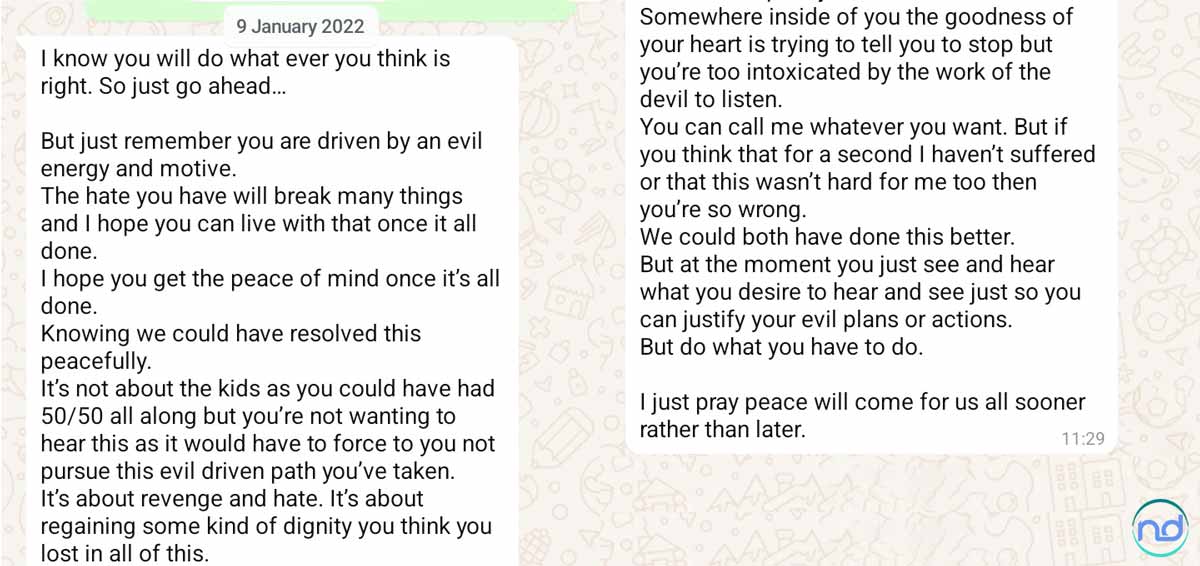
Sara’s message of 9 January 2022 accused me of being “driven by an evil energy and motive“. It claimed my actions were “about revenge and hate.” She insisted I was pursuing an “evil-driven path” despite her own actions.
These messages expose the stark reality behind our situations. While she painted me as evil, my response laid bare the truth:
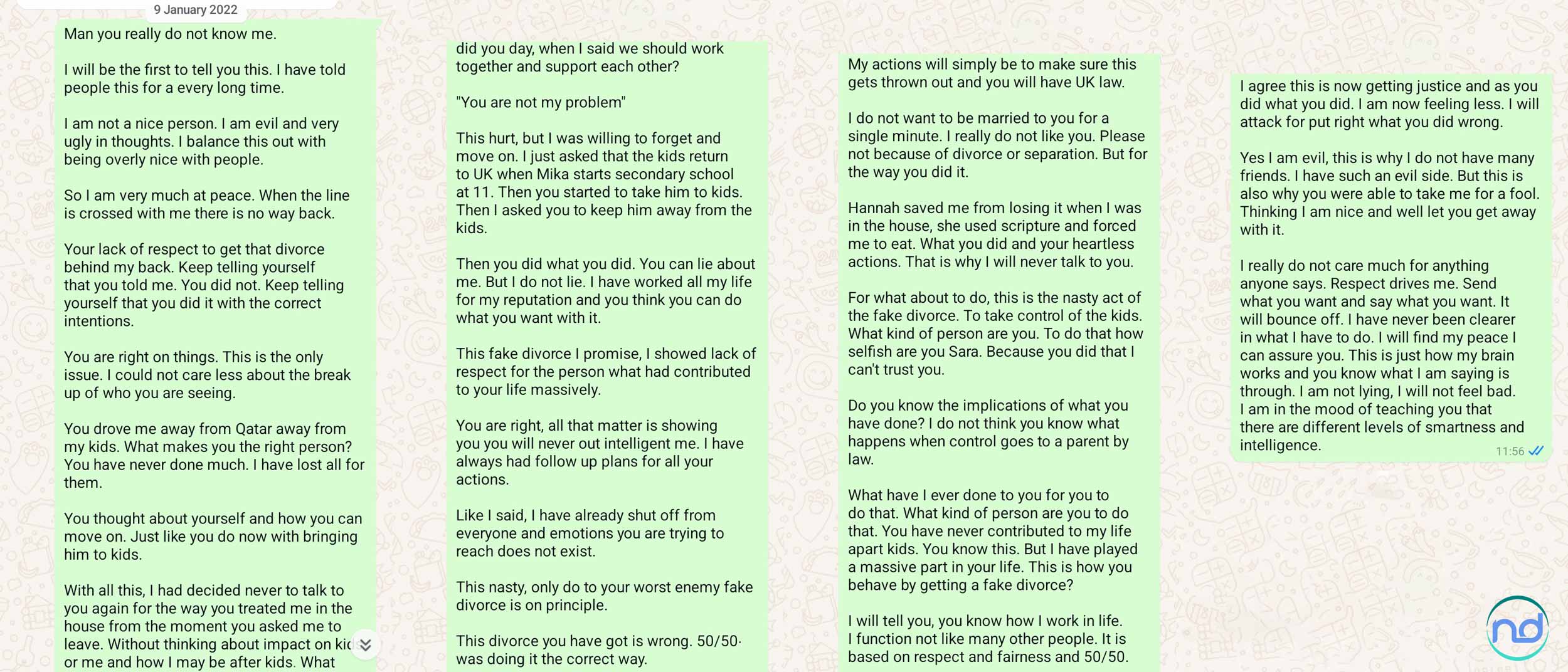
One month after returning to the UK on 9 August 2021, I read “Nelson Mandela – In His Own Words: From Freedom to the Future“. Like Gandhi, Mother Teresa, and Martin Luther King Jr., Mandela represents the highest moral courage—those rare souls who transform personal pain into collective healing.
His teachings on negotiation and sacrifice spoke directly to my situation. Like Mandela emerging from 27 years of imprisonment ready to build peace, I sought reconciliation despite Sara’s forgiveness betrayed.
Below is the raw journey through attempted peace and its bitter aftermath. The evidence—WhatsApp messages, divorce documents, broken promises—tells a story of how Sara Talia weaponised every attempt at reconciliation against our children’s well-being.
Learning from Mandela: The Price of Peace
True negotiations require both parties to accept an uncomfortable truth – neither side will achieve total victory. The challenge lies in finding common ground for a greater purpose, even when that means personal sacrifice.
My experience of forgiveness betrayed with Sara Talia exemplifies this harsh reality. While she retained all advantages – avoiding accountability for her actions – I sought only our children’s well-being. Yet even this basic need for our children’s safety and peace proved too much of a concession.
Mandela’s wisdom on negotiations, captured in his September 1993 keynote address to the Umkhonto we Sizwe National Conference in Eastern Transvaal, resonates deeply:
The most important point to note in relation to negotiations and their relationship to other forms of struggle is that they are not mutually exclusive. Negotiations must be viewed as the culmination of all our collective efforts on different levels, through the use of a variety of methods, under different conditions, to achieve our strategic objective.
His insights continued in that same address:
It is also important to recognise that negotiations are an advance for our struggle. It is the combined efforts of all our people and that of MK in reinforcing the mass struggles of our people which forced the regime to engage in the negotiation process.
These words echo through time, speaking to universal truths about conflict resolution. At the opening of the ANC/NP Summit on 26 September 1992, Mandela further emphasised:
We believe that if negotiations are to succeed, all parties and organisations should be able to strengthen themselves. As difficult as it is, it would be a grave mistake for any organisation to behave in negotiations blinded by sectarian interests.
His address to the Summit of the Patriotic Front in Mahlangu, KwaNdebele, on 24 November 1993 acknowledged the personal cost of such negotiations:
We have reached this point through immense effort and steadfastness of purpose. We have produced a package which all South Africans can be proud of. In the course of negotiations there has been much give and take. Whatever we have given has been done in the interests of the country and without sacrificing our principles.
Years later, when commissioning the Truth and Reconciliation Commission in Cape Town on 13 February 1996, Mandela confronted the challenge of memory versus healing:
There is a view that the past is best forgotten. Some criticise us when we say that whilst we can forgive, we can never forget. They do not agree that perpetrators of human rights violations should make full disclosure and acknowledge what they have done before they can be granted amnesty.
My own experience of forgiveness pales against such monumental struggles; I am a nobody. Yet the principles hold true – genuine negotiation demands honest engagement from both sides. Sara’s actions revealed no real commitment to our children’s well-being, only a desire to escape consequences while maintaining control.
The false promises, the manipulation of international law, and the continued exposure of our children to harmful situations – are all evidence that true reconciliation requires more than one party’s willingness to sacrifice. I will cover these in phase two when I move on to the lifelong impact of childhood trauma that Sara Talia has inflicted on the kids.
When Forgiveness Betrayed: Chronicles of Failed Reconciliation
The path to forgiveness betrayed often begins with seemingly sincere peace offerings. Sara’s initial messages showed contrition and concern for our children’s well-being. Yet beneath this veneer lay her true motive – rushing through divorce proceedings while maintaining complete control.

The message above reveals Sara’s tactical thinking. While wrapping her inquiry in politeness – “I’m sorry to bother you” – she probes my financial capacity to care for the children in the UK. The timing and phrasing expose her true intent: testing whether I could challenge her control rather than genuine concern for the children’s well-being.
Her question about financial capability carries more profound implications. As a mother who obtained a sham divorce through international law, she seeks ammunition to maintain her advantage. The facade of politeness – “I don’t mean this in a rude way” – barely conceals her attempt to gather evidence against any future custody challenge.
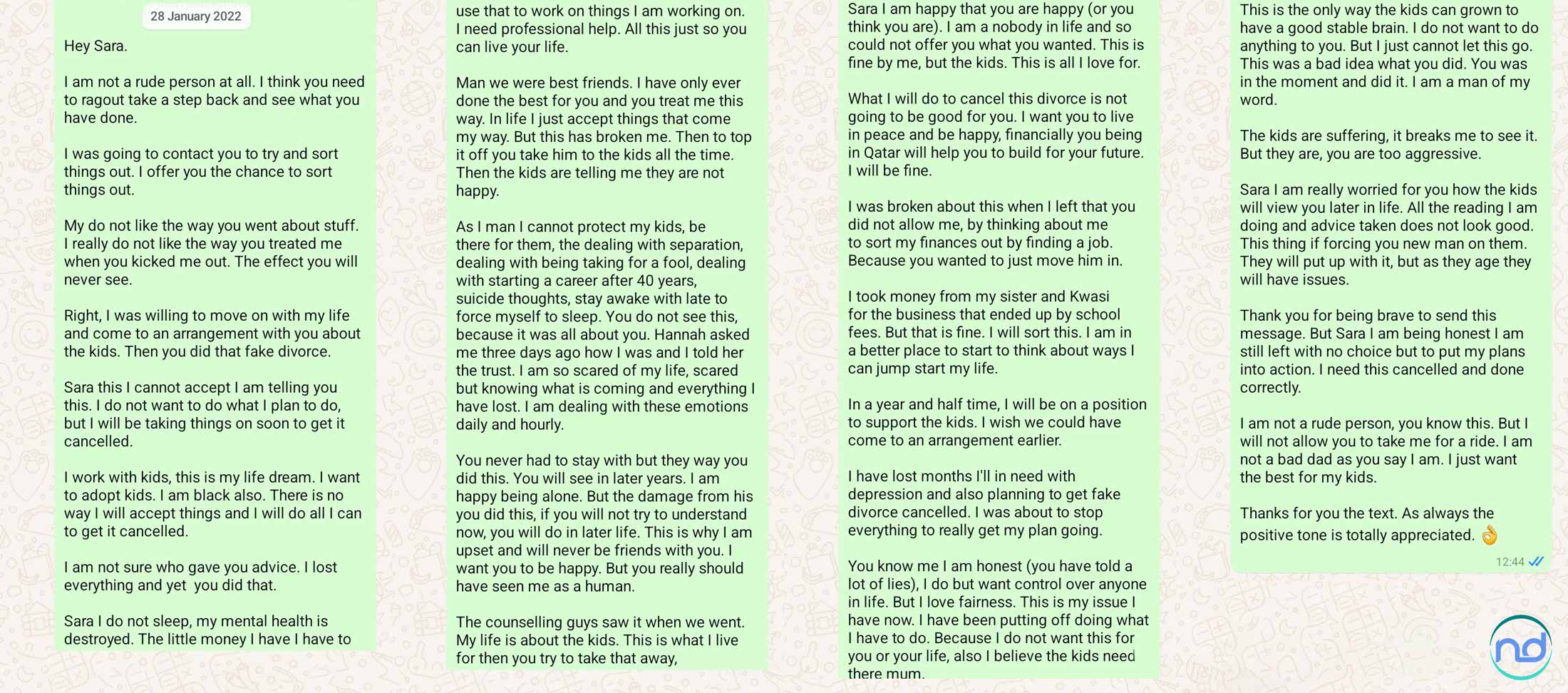
My response above strips away the pretence to expose raw truth. Society often stereotypes black fathers as absent or uncaring. Yet, here I lay bare my soul – speaking of destroyed mental health, sleepless nights, and suicidal thoughts. The statement “I want to adopt kids. I am black also” carries profound weight – asserting my identity as someone who has always prioritised children’s well-being against racist assumptions.
The depth of trauma emerges through admissions of taking money from sister and Kwasi for a business that became school fees. This sacrifice demonstrates how Sara’s actions forced impossible choices – between maintaining financial stability and staying connected to my children. The reference to Hannah (an angel, the kid’s nanny, the lady that kept me alive whilst in Qatar waiting to return to the UK), using scripture to make me eat, reveals the extent of my depression – requiring others to ensure basic survival.
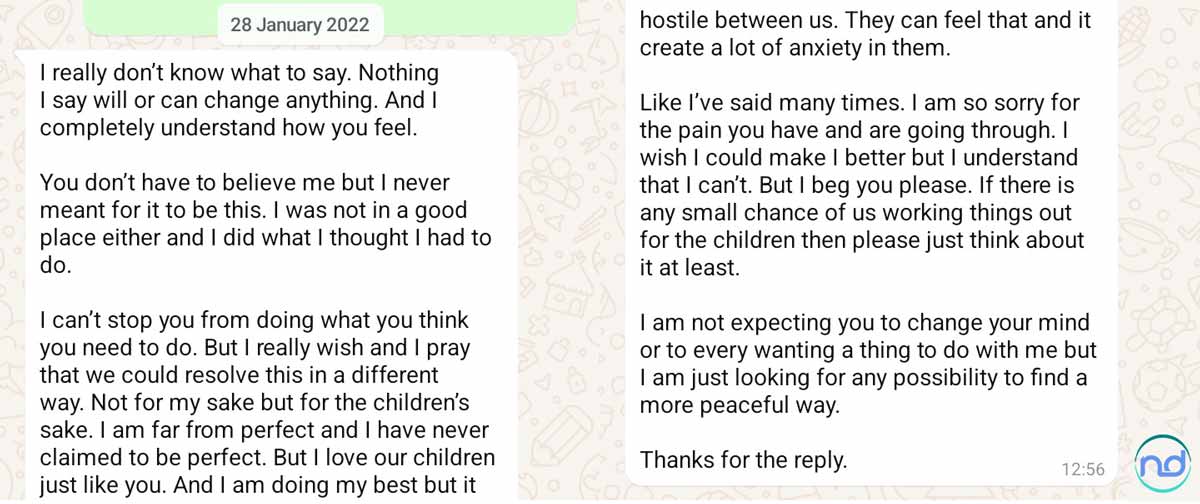
Sara’s message above attempts emotional manipulation through performative understanding. Her claim, “I completely understand how you feel“, rings hollow against her actions. She acknowledges the hostility “creates a lot of anxiety” in the children, yet continues behaviours causing that anxiety.
Her words, “I was not in a good place either“, attempt to equate her voluntary choices with the devastating consequences she inflicted. This false equivalence – comparing her decision to pursue selfish desires with my forced separation from my children – exemplifies how abusers often position themselves as victims.
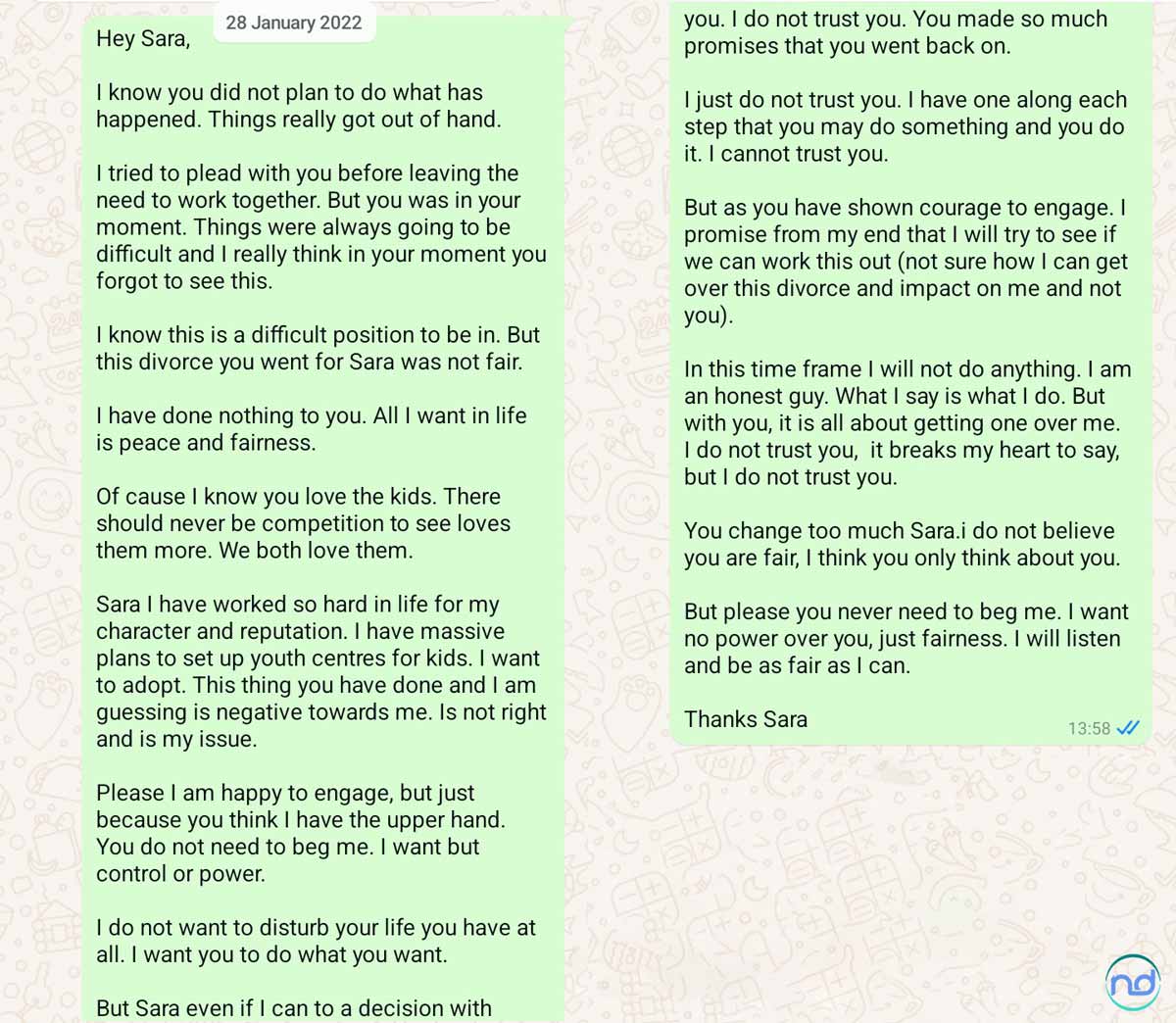
The depth of forgiveness betrayed crystallises in my message above. Despite declaring “I am not a nice person” – acknowledging my capacity for darkness – I focus on fairness and the children’s needs. The repeated emphasis that “I do not trust you” isn’t mere repetition but escalating truth – each instance tied to another betrayal.
My raw admission about being “scared of my life” and everything lost reveals the toll of Sara’s actions. Yet even in this pain, I assert, “I want no power over you, just fairness.” This commitment to justice over revenge, to children’s well-being over personal vengeance, starkly contrasts Sara’s manipulations.
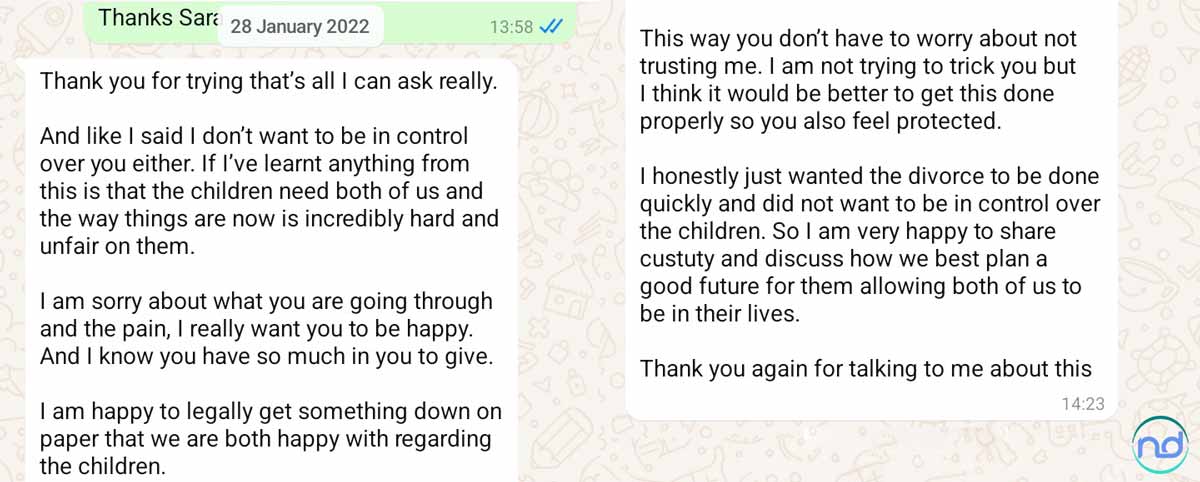
Sara’s response above strips away her remaining pretence. Her claim that she “honestly just wanted the divorce to be done quickly” exposes how her earlier shows of remorse and understanding served only to expedite her goals. The casual admission about not wanting “control over the children” betrays her proper priority – her convenience over their well-being.
Still clinging to hope despite this forgiveness betrayed, I made one final structured attempt at resolution. Our exchanges unfold the evidence of my systematic approach—and Sara’s superficial engagement.
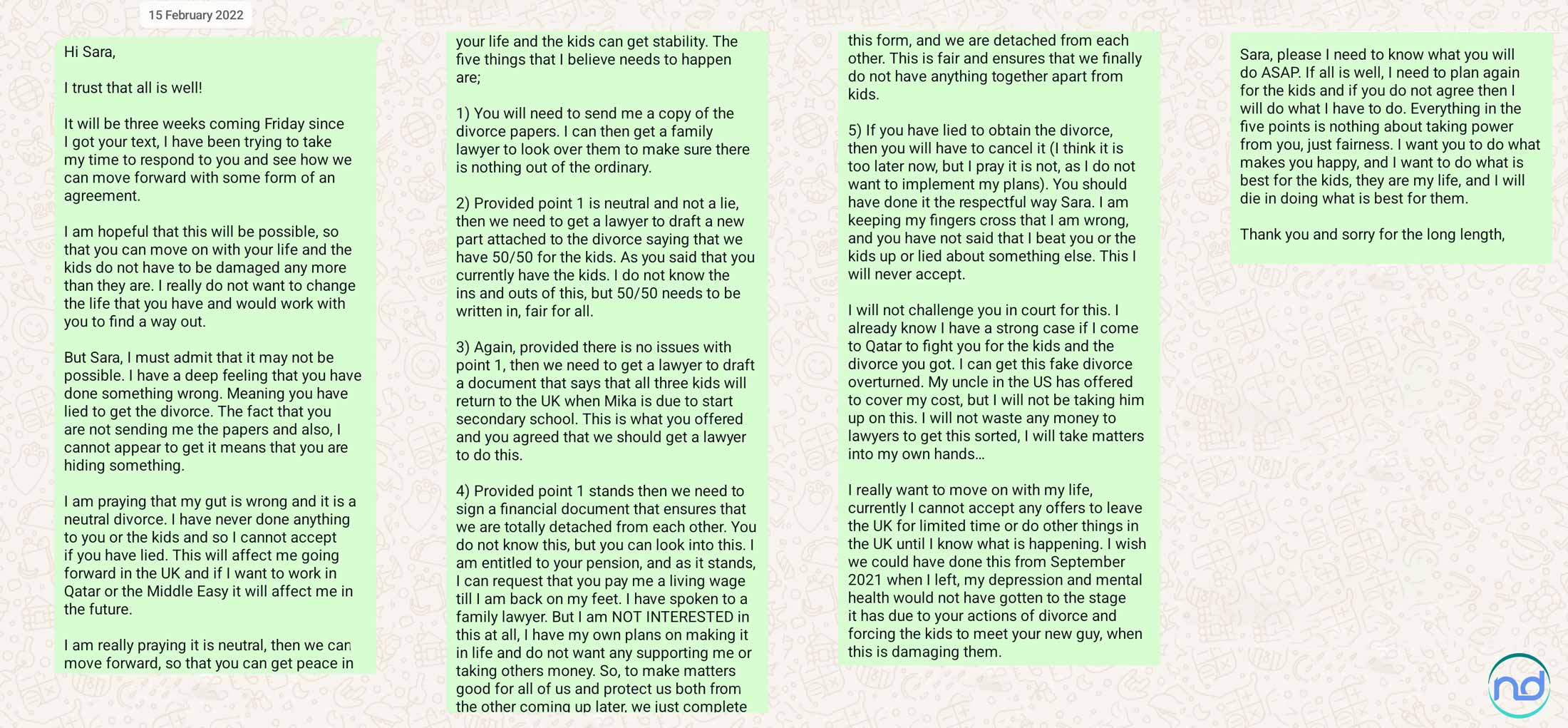
The message above reveals my methodical effort to protect our children’s future. By breaking down five essential points—from verifying divorce papers to ensuring 50/50 custody—I demonstrated commitment to fairness over revenge. Most telling is my raw honesty: “I am praying that my gut is wrong and it is a neutral divorce.” Even facing the possibility of deception, I prioritised a peaceful resolution.
My reference to working in Qatar or the Middle East exposes the professional toll of Sara’s actions – how her manipulation of international law threatened family bonds and career prospects. Yet still, I sought solutions, stating, “Everything in the five points is nothing about taking power from you, just fairness.”
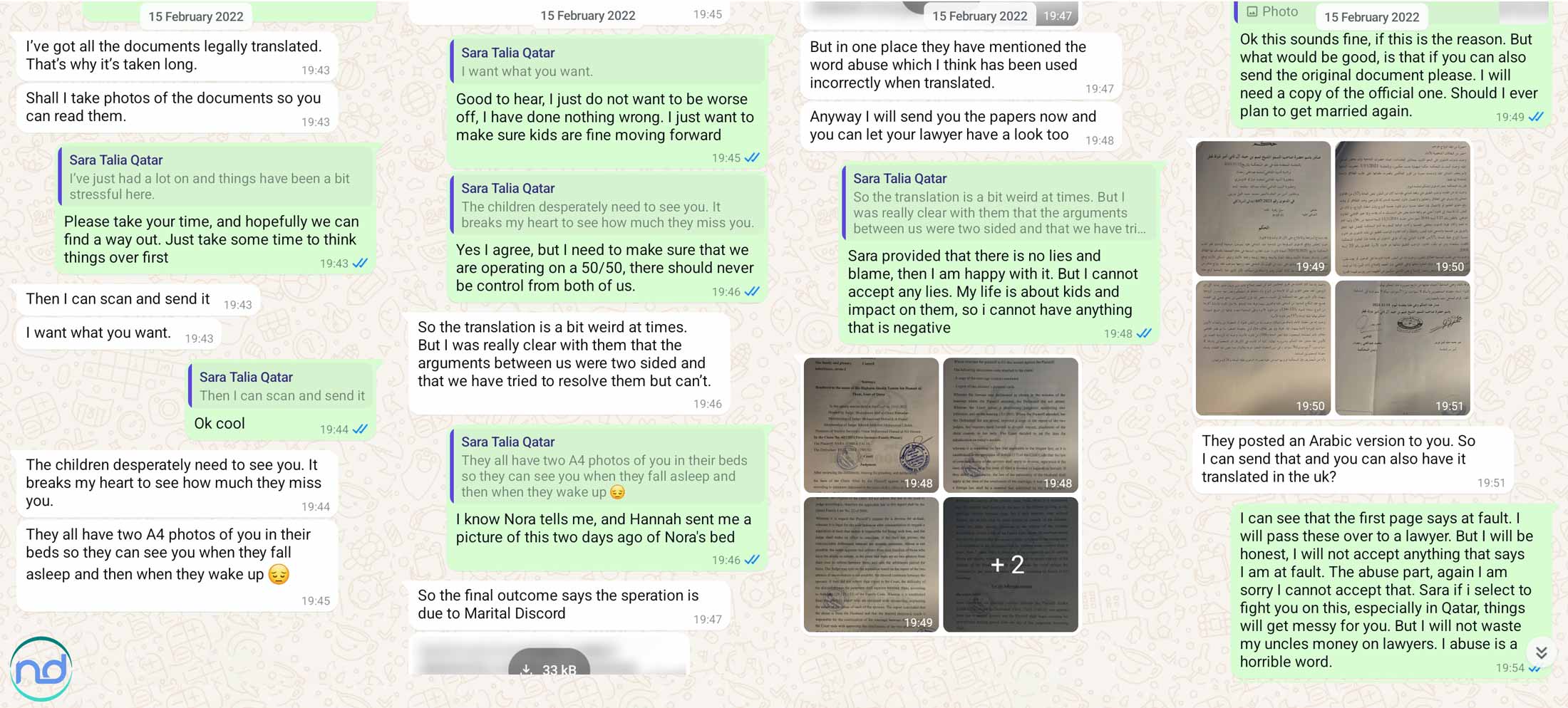
The rapid exchange above shows moments of apparent progress. As we discussed translating documents and navigating legal requirements, brief glimmers of cooperation emerged. Sara’s mention of the children having my photos by their beds – a detail meant to appear caring – actually reveals their ongoing trauma. The conversation about “abuse” in the translation foreshadows more profound revelations about Sara’s tactical use of false accusations.
Each message oscillates between practical details and emotional manipulation. While I focused on concrete steps toward resolution – “operating on a 50/50” basis – Sara alternated between appearing cooperative and inserting reminders of her control over the children’s access to me.
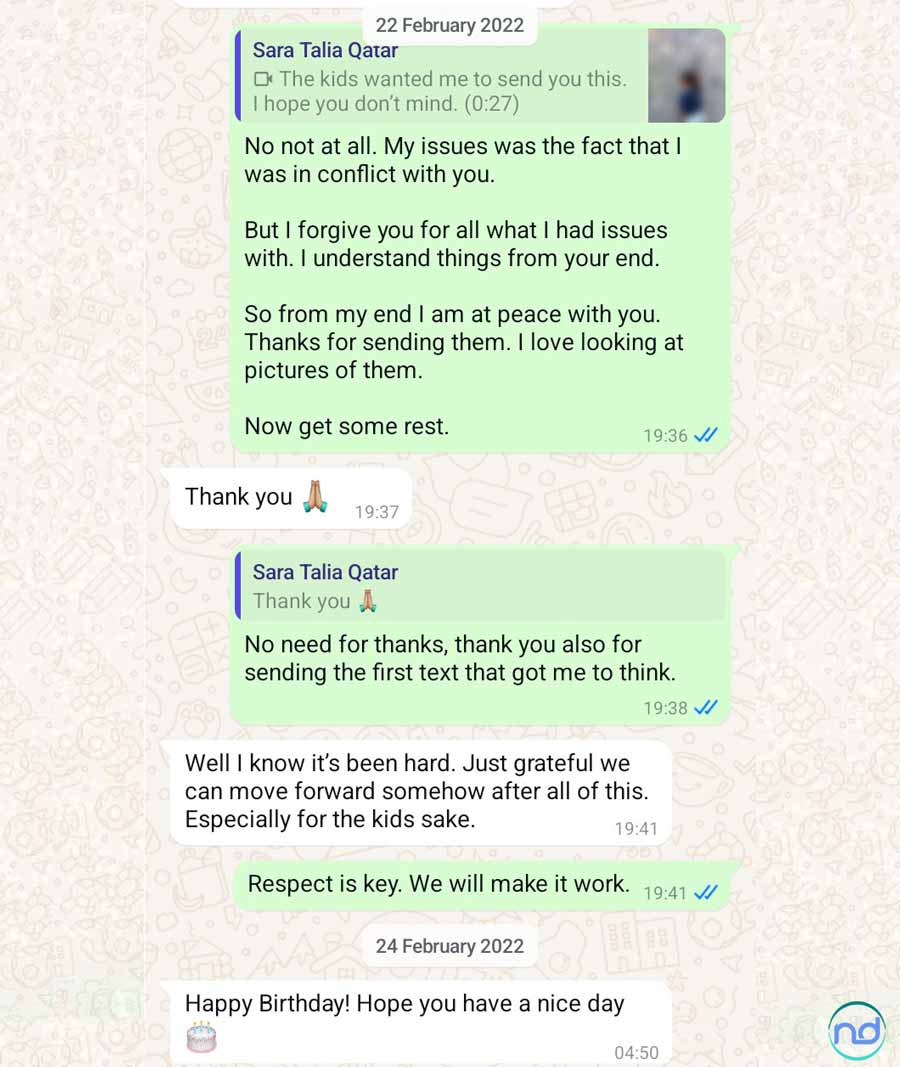
This final exchange marks another instance of forgiveness betrayed, where surface reconciliation masks deeper manipulation. My statement, “I forgive you for all I had issues with,” demonstrates a genuine attempt at peace. Sara’s response, capped with a birthday wish, creates an illusion of progress. She found it within herself to wish me a Happy Birthday, the first word I long to have again, ever since this nightmare and darkness settled over me.
Yet this apparent resolution proved as hollow as her previous promises. The path from structured proposals through these exchanges to superficial pleasantries simply masked her unchanged agenda – maintaining control while appearing reasonable.
Just as the translated divorce papers revealed her willingness to use false accusations, these exchanges expose how reconciliation attempts became a mere theatre in her larger strategy and selfishness.

From Forgiveness to Final Justice
As Moisés Naim observes, the dynamics of power hinge on the ability to affect bargaining outcomes. Sara Talia’s approach to reconciliation revealed this dance of power distribution – her calculated move to neutralise threats while maintaining control. Like a skilled chess player, she anticipated my next move, though she never fully grasped what piece I planned to sacrifice.
When she extended that olive branch, I seized it with both hands. The relief was immediate – like watching a parasite being extracted from your flesh. The daily weight of negativity, that blood-sucking mosquito of constant conflict, finally lifted. Even knowing I’d conceded more than my fair share, the prospect of peace for our children’s sake felt worth any personal cost. Another instance of forgiveness betrayed.
But peace proved as substantial as desert mirages. Through Easter and summer visits in 2022, our children revealed the bitter truth – Sara had instructed them to lie while exposing them to her domestic abuser boyfriend. My carefully constructed seven-month strategy, leveraging media attention during the Qatar 2022 World Cup, crumbled.
I’d planned to expose how a European-raised individual could strip away parental rights more entirely than those granted to paedophiles and murderers in the UK. While British law demands years of separation for divorce, Sara had engineered her sham settlement in mere months through Qatar’s courts.
She sensed my strategic positioning—her anxiety manifesting in disturbed eating patterns the children reported—but never grasped its full scope. Her preemptive peace offering derailed my plans, but like any skilled tactician, I adapted. When one attack vector closes, multiple alternatives emerge. In less than a year, I’ve mastered new programming languages, rebranded my digital presence, and constructed a multi-phase strategy to yield even more decisive results.
This time, there will be no peace talks. I’ve systematically detached from every potential influence – family, friends, and society. Even my mother, my GOAT parent and closest confidante, I’ve distanced myself from. Her pleas to forgive Sara again fall on ears that have grown wise to the cost of mercy. This spiritual struggle led me to explore the complex relationship between divine forgiveness and earthly justice.
They say, “Fool me once, shame on me” (not shame on you), “Fool me twice, I’m a moron” (not shame on me). When I turned the other cheek like Jesus would, Sara practically snapped my neck clean off.
I speak this truth like pure science – thoughts crystallising in my consciousness, triggering vocal cord vibrations propagating through air molecules as sound waves, reaching ears or materialising as ink on paper without filtration or sugar-coating. Raw truth, straight from synapse to soundwave.
Sara Talia better take notes from Beyoncé’s Cowboy Carter (Beyoncé Finally Wins Best Album at Grammy Awards). Like Queen Bee had to go Western to claim her first Album of the Year, Sara needs to saddle up. Strap on that holster, load that chamber, and brace for the incoming storm of justice.
No more peace talks, no more turned cheeks – I’ve stripped away every attachment that might stay in my hand.
I’ve ripped up my lottery ticket to paradise/heaven and bought myself a one-way ticket straight to hell. The deal is straightforward – if I can’t forgive others their sins, mine won’t be forgiven either. Fine by me. I’ll take my justice here on earth where I can watch it unfold with my own eyes, then burn in eternal flames later. At least I’ll burn knowing I protected my kids instead of playing holy while they suffered.
The final act of this forgiveness betrayed approaches. Without family trying to broker peace or friends counselling patience, I move unencumbered toward justice. I am not Jesus, and this is not a parable of forgiveness. This is a reckoning.

